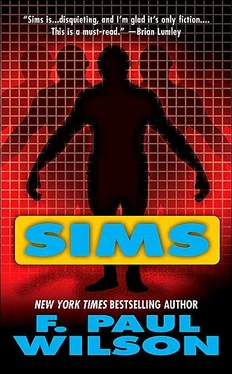F Wilson - Sims
Здесь есть возможность читать онлайн «F Wilson - Sims» весь текст электронной книги совершенно бесплатно (целиком полную версию без сокращений). В некоторых случаях можно слушать аудио, скачать через торрент в формате fb2 и присутствует краткое содержание. Жанр: Фантастика и фэнтези, на английском языке. Описание произведения, (предисловие) а так же отзывы посетителей доступны на портале библиотеки ЛибКат.
- Название:Sims
- Автор:
- Жанр:
- Год:неизвестен
- ISBN:нет данных
- Рейтинг книги:3 / 5. Голосов: 1
-
Избранное:Добавить в избранное
- Отзывы:
-
Ваша оценка:
- 60
- 1
- 2
- 3
- 4
- 5
Sims: краткое содержание, описание и аннотация
Предлагаем к чтению аннотацию, описание, краткое содержание или предисловие (зависит от того, что написал сам автор книги «Sims»). Если вы не нашли необходимую информацию о книге — напишите в комментариях, мы постараемся отыскать её.
Sims — читать онлайн бесплатно полную книгу (весь текст) целиком
Ниже представлен текст книги, разбитый по страницам. Система сохранения места последней прочитанной страницы, позволяет с удобством читать онлайн бесплатно книгу «Sims», без необходимости каждый раз заново искать на чём Вы остановились. Поставьте закладку, и сможете в любой момент перейти на страницу, на которой закончили чтение.
Интервал:
Закладка:
When they quieted enough for him to be heard he said, “Please. I’m trying to have lunch with my family.”
Cries of “Aaaaaw!” and “Pity the poor man!” rose, and one woman stepped forward to snarl, “Yeah! Eating lunch grown and harvested by slave labor!”
Ellis stepped forward. He’d noticed something interesting about a number of the protesters.
“If this is supposed to accomplish something,” he told them, “I assure you it won’t. Perhaps a more sincere group might make a point, but not a bunch of hypocrites.”
Ellis kept moving into the gasps of “What!” and “You bastard!” and “What right?” and pointed to the snarling woman’s handbag.
“Balducci, right?”
Her only reply was a stunned look.
“Sim made!” Ellis pivoted and jabbed a finger at the insignia on a man’s windbreaker. “Tammy Montain—sim made!” As he slipped deeper into the throng, pointing out all the popular labels that used sim labor, crying “Sim made!” over and over, he knew he should be careful. But these people angered him, and not simply because they’d interrupted his lunch.
Finally he was back where he’d started and could see by their expressions and averted eyes that he’d taken the steam out of them.
“How can you be part of the solution when you’re part the problem?” he said, knowing it was a cliché but knowing too that it would hit home. “You really want to ‘free the sims’? The fastest way is to boycott any company that uses them as labor. Companies understand one thing: the bottom line. If that’s falling off because they use sim labor, then they’re going tostop using sim labor. It’s as simple as that. But you can’t show up here wearing sim-made clothes and shoes and accessories and expect anyone with a brain to take you seriously. If you’re sincere about this you’re going to have to make some sacrifices, you’re going to have to let the Joneses have the more prestigious sim-made car, the more fashionable sim-made sweater. Otherwise, you’re just blowing smoke.”
Ellis stepped back inside and closed the door behind him. He had no idea what the protesters would do next, but the question was made moot by the arrival of half a dozen cops who began herding them off.
He returned to the table to find his family staring at him.
“Dad,” Robbie said, wide-eyed. “You were great!”
“Ellis?” Judy said. Ellis noticed a tremor in her voice, and were those…?
Yes, she had tears in her eyes. “For a moment there you were like…like you used to be.”
He looked into her moist blue eyes. God, he wanted her back, more than anything in the world.
“I don’t know if I can ever be like I used to be, Judy,” he said, knowing his soul was scarred beyond repair. “But if things go right, if a few things happen the way I hope they will, I should be able to present a reasonable facsimile.”
“But Dad,” Robbie was saying, “you were, like, telling them how to, like, so screw your own company.”
Ellis put on a pensive expression. “You know, Robbie, now that you mention it, I believe I was. I’ll have to be more careful in the future.”
“Will sims ever evolve into humans?” Julie said, looking up at him with her mother’s huge blue eyes.
Ellis stared at her, momentarily dumb.
“She’s studying evolution in school,” Judy offered.
Ellis cleared his throat and controlled the sudden urge to run from the room. He’d rather be off the subject of sims—this was Robbie’s birthday after all—and especially off their evolutionary genetics, but how could he not answer the jewel of his life?
“Doyou think they will?”
“Well,” she said slowly, “we humans evolved from chimps, and sims are a mix of chimps and humans, so won’t sims evolve into humans someday?”
“No,” Ellis said, choosing his words carefully. “You see, humans didn’t evolve from chimps; chimps and humans are primates and both evolved from a common primate ancestor, an ape that had evolved from the monkeys.”
“A gorilla?”
“No. Gorillas branched off earlier. Let’s just call our common ancestor the mystery primate.”
Julie grinned. “Why call him ‘mysteryprimate’?”
“Because we haven’t found his bones yet. But we don’t need to. Genetics tells the story. So even though we may never identify the mystery primate’s remains, we know he existed and we know that at some point millions of years ago, whether because of a flood or a continental upheaval or climactic changes in Africa, a segment of the mystery primate population became separated from the larger main body. This smaller group wound up stranded in a hotter, drier environment, probably in northeast Africa; some theories say it was an island, but whatever the specifics, the important point is they were cut off from all the other jungle-dwelling primates. And there, under pressure to adapt to their new environment, they began to evolve in their own direction.”
“But didn’t the mystery primates in the jungle evolve too?”
“Of course, but because they were in an environment they were used to, they had little need for change, so they evolved more slowly, and in a different direction: toward what we now call chimpanzees. Meanwhile the primates in the separated group, in a drier, savanna-like environment, were changing: They were growing taller, their skin was losing its hair and learning to sweat in the hotter temperatures; and because they were no longer in a lush jungle where food was hanging from every other tree, they had to learn to hunt to keep from starving. This added extra protein to their diet which meant they could afford to enlarge a very important organ that needs lots of protein to grow. Do you know what that organ is?”
“The brain,” Julie said.
“You aresmart ,” he told her. “Absolutely right. The sum of all these changes meant that they were evolving into hominids.”
“Humans, right?”
“Humans are hominids, true, but it took millions of years for the first hominids to evolve intoHomo sapiens .”
“But once they got back to the jungle, couldn’t the hominids get back together with the mystery primates?”
Bright as Julie was, Ellis wondered how far he could delve into the intricacies of evolutionary drift with a thirteen-year-old. He paused, looking for an analogy. He knew she played the cello in her school orchestra…maybe she could understand if he related evolution to music.
“Think of DNA as a magnificent symphony, amazingly complex even though it is composed with only four notes. Every gene is a movement, and every base pair is a musical note within that movement. So if one of those base pairs is out of sequence, the melody can go wrong, become discordant. If enough are out of place, it can ruin the entire symphony. But sometimes changes can work to the benefit of the symphony.
“Imagine the sheet music for a concert arriving in a city far from where it was composed. The local musicians look at it and say, ‘No one around here is going to like this section, nor that movement; we’d better change them.’ And they do. And then that version is shipped off to another city even farther away, and those local musicians find they must make further changes to satisfy their audience. And on it goes, until the music is radically different from what was on the original sheets.
“This is what happened to the sheet music of the hominid’s DNA. It was progressively changed by different environments; but the chimp DNA never left its hometown, so it changed relatively little. And because they’d been separated, with the genes of one group never having a chance to mix with the genes of the other, each group kept evolving in its own direction, causing their genomes to drift further and further apart.
Читать дальшеИнтервал:
Закладка:
Похожие книги на «Sims»
Представляем Вашему вниманию похожие книги на «Sims» списком для выбора. Мы отобрали схожую по названию и смыслу литературу в надежде предоставить читателям больше вариантов отыскать новые, интересные, ещё непрочитанные произведения.
Обсуждение, отзывы о книге «Sims» и просто собственные мнения читателей. Оставьте ваши комментарии, напишите, что Вы думаете о произведении, его смысле или главных героях. Укажите что конкретно понравилось, а что нет, и почему Вы так считаете.












